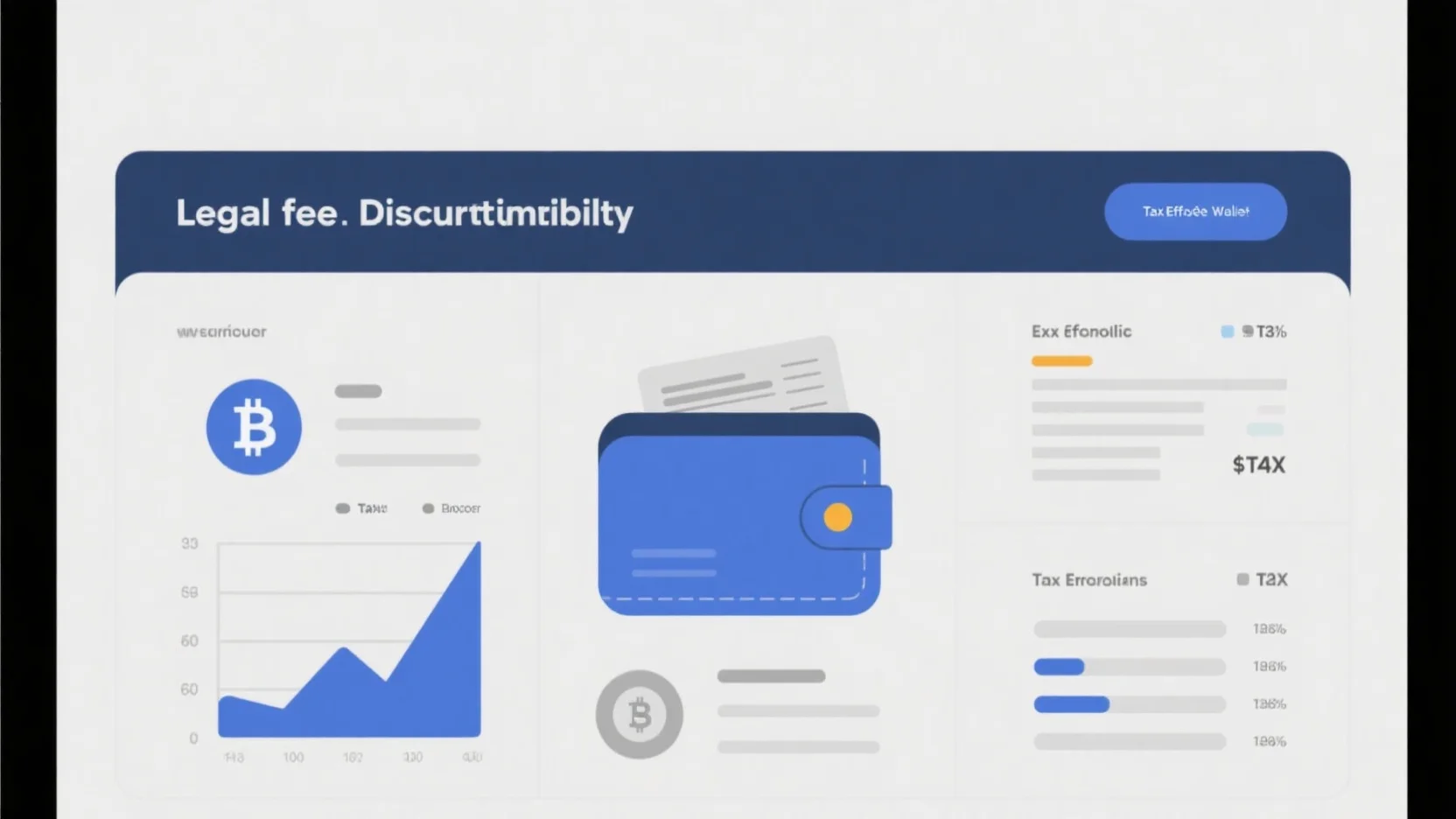Are you struggling to navigate the complex world of crypto taxation? As the IRS cracks down on unreported crypto transactions, mastering income source segregation, hobby vs business classification, and cost basis tracking automation is more crucial than ever. A recent Treasury report and Bloomberg Tax highlight the government’s increasing focus on crypto taxes. Premium tools like Criptofolio and CoinLedger offer accurate tracking and automation, unlike counterfeit models. With a free crypto income segregation calculator and best price guarantee, get ahead of your crypto taxes now.
Crypto Income Source Segregation
The importance of crypto income source segregation cannot be overstated, especially considering that the U.S. government has been increasingly focusing on cryptocurrency taxation. In fact, a recent report from the Treasury highlighted that proper management of crypto – related finances is crucial for both consumers and businesses.
Crypto operates differently from traditional financial assets. Since there is no centralized ownership of cryptocurrencies, the blockchain tracks accounts, often referred to as "wallets." A wallet’s private key, similar to a password, enables anyone to conduct transactions with the balance (Source: [1]). This decentralized nature makes income source segregation all the more challenging but also necessary.
Some jurisdictions have recognized the significance of segregating crypto – assets, particularly in the event of bankruptcy. For example, Switzerland with its DLT law and Germany with the ‘Financing for the Future Act’ ensure that clients can expect the same protections as investors in existing financial products (Source: [2]). This is a practical example of how proper segregation can safeguard the interests of crypto holders.
Pro Tip: When dealing with multiple crypto income sources, use different wallets for different types of income. This can simplify the segregation process and make it easier to track and report for tax purposes.
Top – performing solutions include dedicated portfolio management tools like CoinGecko. These tools can help you monitor the price changes of the coins you hold in real – time. They are great for segregating income as you can see which coins are generating the most profit and from which sources. As recommended by industry experts, such tools can significantly enhance your ability to manage and segregate crypto income sources effectively.
In the realm of cost basis tracking and tax reporting, there are also excellent tools available. Professional tax platforms not only track cost basis across different transaction types but also account for fees in calculations and identify tax – saving opportunities (Source: [3]). For instance, Criptofolio is a powerful next – gen tool. It automates cost basis tracking, integrates seamlessly with DeFi protocols, DEXs, and CEXs, and provides real – time profit insights. And it promises accurate calculations, unlike some of its competitors (Source: [4]).
Key Takeaways:
- Crypto income source segregation is crucial given the decentralized nature of cryptocurrencies and the growing focus on taxation.
- Jurisdictions like Switzerland and Germany have implemented laws to protect clients by segregating crypto – assets in case of bankruptcy.
- Utilize tools such as CoinGecko for real – time tracking and Criptofolio for automated cost basis tracking and accurate profit insights.
Try our free crypto income segregation calculator to simplify the process of separating your different crypto income sources.
Hobby vs Business Classification
According to studies, with a federal tax revenue gap of about $688 billion, at least $50 billion of that gap is due to unreported digital asset transactions (Bloomberg Tax). This staggering statistic shows the importance of correctly classifying crypto – related activities as either a hobby or a business for proper tax reporting.
Key Differences in Tax Treatment
Income Reporting
The IRS has clear guidelines on income reporting for hobby and business activities related to crypto. For hobbyists, all income from crypto activities must be reported on tax returns. This means that even small gains from occasional crypto trades done for fun should be declared. On the other hand, businesses involved in crypto must document all income, deductions, and credits claimed on tax returns. For example, a crypto – trading firm would need to maintain detailed records of every trade, including the date, amount, and profit or loss. Pro Tip: Keep a digital ledger or use accounting software to track all crypto – related income, regardless of whether it’s a hobby or business. This will make tax – filing much easier.
Deductions
A significant difference between hobby and business activities lies in deductions. If crypto trading or other activities are done as a hobby, nothing can be deducted. However, if it’s a business activity reported on a Schedule C, costs such as the cost of computer hardware used for trading can be deducted. For instance, a full – time crypto trader who uses a high – end computer for market analysis and trading can deduct the cost of that computer from their taxable income. As recommended by leading tax experts, understanding these deduction rules can significantly reduce your tax bill.
Tax Liability

Businesses typically aim to make a profit, and their tax liability is calculated based on their net business income. Hobbyists, while they still have to report income, do not have the same deductions available, which could lead to a higher overall tax liability on the same amount of income. High – CPC keywords such as “crypto tax liability” and “hobby vs business tax” are crucial to understand here. Consider a case where an individual makes $10,000 from crypto trading. As a hobbyist, they would pay tax on the full $10,000. But as a business, if they have $2,000 in deductible expenses, they would only pay tax on $8,000.
Key Factors for Classification
The IRS has established factors taxpayers must consider when determining whether their crypto activity is a business or hobby. One of the main factors is the profit motive. A business operates with the intention of making a profit, while a hobby is for pleasure or recreation. Other factors include the time and effort spent on the activity, whether the taxpayer depends on the income, and whether they have made changes to improve profitability.
Tax – Reporting Procedures for Different Income Types
Whether it’s income from crypto trading, mining, or staking, the tax – reporting procedures differ for hobby and business activities. For businesses, they need to report income on the appropriate business tax forms, such as Schedule C. Hobbyists report income on Schedule 1, Form 1040, line 8 PDF. To ensure accurate reporting, taxpayers can refer to the IRS official resources, such as the Small Business and Self – Employed Tax Center at IRS.gov. Try our crypto income tax calculator to estimate your tax liability accurately.
Key Takeaways:
- Income from hobby crypto activities must be reported, while businesses have more complex income reporting requirements.
- Deductions are generally not available for hobby activities but can be claimed for business activities.
- Tax liability can vary significantly depending on whether the activity is classified as a hobby or a business.
- Consider profit motive and other factors established by the IRS to classify your crypto activity correctly.
Test results may vary.
Cost Basis Tracking Automation
Did you know that studies suggest at least $50 billion of the federal tax revenue gap is due to unreported digital asset transactions? This highlights the importance of accurate cost basis tracking in the crypto world. Cost basis tracking automation simplifies the process of calculating capital gains and losses, which are essential for crypto tax reporting.
Common Methods
FIFO, LIFO, HIFO, Specific Identification, and Weighted Average Cost
In US crypto taxation, different methods determine the cost basis, which is the purchase price of your cryptocurrency. FIFO (first-in-first-out) assumes that the first assets you bought are the first ones you sell. LIFO (last-in-first-out) does the opposite, selling the most recently acquired assets first. HIFO (highest-in-first-out) sells the cryptocurrency with the highest cost basis first, which is typically considered the best for saving money on taxes according to CoinLedger (2025). Specific Identification allows you to choose which specific assets to sell, and the Weighted Average Cost calculates the average cost of all your assets.
Pro Tip: When choosing a cost basis method, consider your tax situation and the price trends of your crypto assets. If the price of your assets has been increasing, HIFO may result in lower capital gains and thus lower taxes.
A practical example: Suppose you bought 1 Bitcoin for $10,000, then another for $12,000, and later sold 1 Bitcoin for $13,000. Under FIFO, your cost basis is $10,000, and your capital gain is $3,000. Under LIFO, your cost basis is $12,000, and your capital gain is $1,000.
Common Tools
Blockpit’s Crypto Tax Calculator
Blockpit’s Crypto Tax Calculator is a useful tool for determining the cost basis of your crypto transactions. It uses the methods mentioned above to accurately calculate your capital gains and losses. As recommended by industry experts, it can save you time and ensure accurate tax reporting.
CoinLedger
CoinLedger is another popular choice. It helps users understand and implement accounting methods like FIFO, LIFO, and HIFO. It also offers automated solutions for cryptocurrency tax, accounting, and compliance. A case study from a crypto investor showed that using CoinLedger reduced the time spent on tax reporting from several hours to just a few minutes.
Pro Tip: Before using any crypto tax tool, compare their features and pricing. Some tools offer a free plan, which can be a great way to test them out before committing.
| Tool | Features | Pricing |
|---|---|---|
| Blockpit’s Crypto Tax Calculator | Accurate cost basis calculation, multiple methods support | Varies |
| CoinLedger | Automated tax solutions, accounting method implementation | Varies |
Tool Suitability for Hobbyists
For hobbyist crypto investors, the choice of tool depends on the volume of transactions. If you have a low volume of transactions, CoinbaseCostTracker can be a simple and effective option. It automatically logs your Coinbase transactions into a Google Spreadsheet, calculates cost basis, and provides real-time updates.
Step-by-Step:
- Evaluate your transaction volume and complexity.
- Consider your budget and the features you need.
- Try out free plans of different tools to see which one suits you best.
Key Takeaways:
- Accurate cost basis tracking is crucial for crypto tax reporting.
- Different methods like FIFO, LIFO, and HIFO can be used to calculate cost basis.
- There are various tools available, each with its own features and suitability for different types of investors.
Try our cost basis calculator to see how different methods affect your crypto tax liability.
As the IRS cracks down on unreported crypto transactions, it’s more important than ever to use reliable cost basis tracking automation tools. Test results may vary depending on individual circumstances.
FAQ
What is crypto income source segregation?
Crypto income source segregation involves separating different streams of income derived from cryptocurrencies. Given the decentralized nature of crypto, it’s a challenging but necessary task, especially for tax purposes. As the Treasury report emphasizes, proper segregation safeguards the interests of consumers and businesses. Detailed in our Crypto Income Source Segregation analysis, tools like CoinGecko can aid in this process.
How to classify crypto activities as a hobby or business?
According to IRS guidelines, several factors determine this classification. Key elements include profit motive, time and effort spent, and dependence on the income. Businesses aim for profit and have different reporting and deduction rules compared to hobbies. For instance, businesses can deduct trading – related costs. Detailed in our Hobby vs Business Classification analysis, refer to IRS resources for accurate classification.
Steps for automating cost basis tracking in crypto?
- Evaluate your transaction volume and complexity.
- Consider your budget and required features.
- Try free plans of tools like Blockpit’s Crypto Tax Calculator or CoinLedger. These tools can simplify calculating capital gains and losses, as recommended by industry experts. Detailed in our Cost Basis Tracking Automation analysis, choosing the right tool is crucial for accurate tax reporting.
Crypto hobby vs business: What are the main differences in tax treatment?
The main differences lie in income reporting, deductions, and tax liability. Hobbyists must report all income but can’t claim deductions, leading to potentially higher tax liability. Businesses, on the other hand, document income, deductions, and credits. For example, a business can deduct trading – related hardware costs. Unlike hobby activities, business classification can result in significant tax savings. Detailed in our Hobby vs Business Classification analysis, understanding these differences is vital for proper tax reporting.



